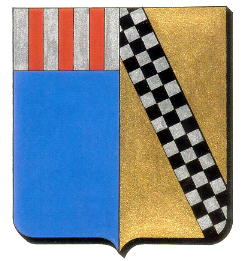Zomergem: Difference between revisions
Knorrepoes (talk | contribs) m (Text replacement - "50 px|link=Belgium[[Category" to "[[Category") |
Knorrepoes (talk | contribs) m (Text replacement - "{{be}}↵↵'''" to "'''") Tags: Mobile edit Mobile web edit |
||
| (5 intermediate revisions by the same user not shown) | |||
| Line 1: | Line 1: | ||
'''ZOMERGEM''' | '''ZOMERGEM''' | ||
Province : [[Oost-Vlaanderen]]<br/> | Province : [[Oost-Vlaanderen]]<br/> | ||
Additions : 1977 Oostwinkel, Ronsele | Additions : 1977 Oostwinkel, Ronsele<br> | ||
Incorporated into : 2019 [[Lievegem]] | |||
[[File:zomergem.jpg|center|Wapen van {{PAGENAME}}]] | [[File:zomergem.jpg|center|Wapen van {{PAGENAME}}/Coat of arms (crest) of {{PAGENAME}}]] | ||
===Official blazon=== | ===Official blazon=== | ||
| Line 14: | Line 13: | ||
The arms were officially granted on July 7, 1987. | The arms were officially granted on July 7, 1987. | ||
Zomergem and Ronsele were an estate directly governed by the | Zomergem and Ronsele were an estate directly governed by the Count of Vlaanderen until 1559. The last Counts of Zomergem were from the Montmorency family, and the only known seal of the village, dating from 1775-1787, shows the arms of [[Montmorency]]. | ||
The municipality, however, did not use this seal for its arms in 1987, but used a combination of the arms of the Van Zomergem family and the Adorne family. The Van Zomergem family was a noble family, which probably originated from the area. Their arms showed a blue shield with a silver chief with three red pales. | The municipality, however, did not use this seal for its arms in 1987, but used a combination of the arms of the Van Zomergem family and the Adorne family. The Van Zomergem family was a noble family, which probably originated from the area. Their arms showed a blue shield with a silver chief with three red pales. These arms were also proposed as arms for Oostwinkel in the late 1960s, but these were never granted. | ||
The other hals shows the Adorne arms, as the family ruled the village of Ronsele from the laet 14th century until 1699. | The other hals shows the Adorne arms, as the family ruled the village of Ronsele from the laet 14th century until 1699. | ||
| Line 22: | Line 21: | ||
{{media}} | {{media}} | ||
[[Civic Heraldry Literature - Belgium|Literature]] : Viane-Awouters and Warlop, 2002. | [[Civic Heraldry Literature - Belgium|'''Literature''']]: Viane-Awouters and Warlop, 2002. | ||
[[Category:Belgian Municipal Arms Z]] | [[Category:Belgian Municipal Arms Z]] | ||
[[Category:Oost-Vlaanderen]] | [[Category:Oost-Vlaanderen]] | ||
[[Category:Granted 1987]] | [[Category:Granted 1987]] | ||
Latest revision as of 07:00, 3 September 2023
ZOMERGEM
Province : Oost-Vlaanderen
Additions : 1977 Oostwinkel, Ronsele
Incorporated into : 2019 Lievegem
Official blazon
Gedeeld 1. in lazuur een schildhoofd van zilver, beladen met drie palen van keel 2. in goud een geschaakte schuinbalk van drie rijen van zilver en van sabel.
Origin/meaning
The arms were officially granted on July 7, 1987.
Zomergem and Ronsele were an estate directly governed by the Count of Vlaanderen until 1559. The last Counts of Zomergem were from the Montmorency family, and the only known seal of the village, dating from 1775-1787, shows the arms of Montmorency.
The municipality, however, did not use this seal for its arms in 1987, but used a combination of the arms of the Van Zomergem family and the Adorne family. The Van Zomergem family was a noble family, which probably originated from the area. Their arms showed a blue shield with a silver chief with three red pales. These arms were also proposed as arms for Oostwinkel in the late 1960s, but these were never granted.
The other hals shows the Adorne arms, as the family ruled the village of Ronsele from the laet 14th century until 1699.
Contact and Support
Partners:
Your logo here ?
Contact us
© since 1995, Heraldry of the World, Ralf Hartemink
Index of the site
Literature: Viane-Awouters and Warlop, 2002.
